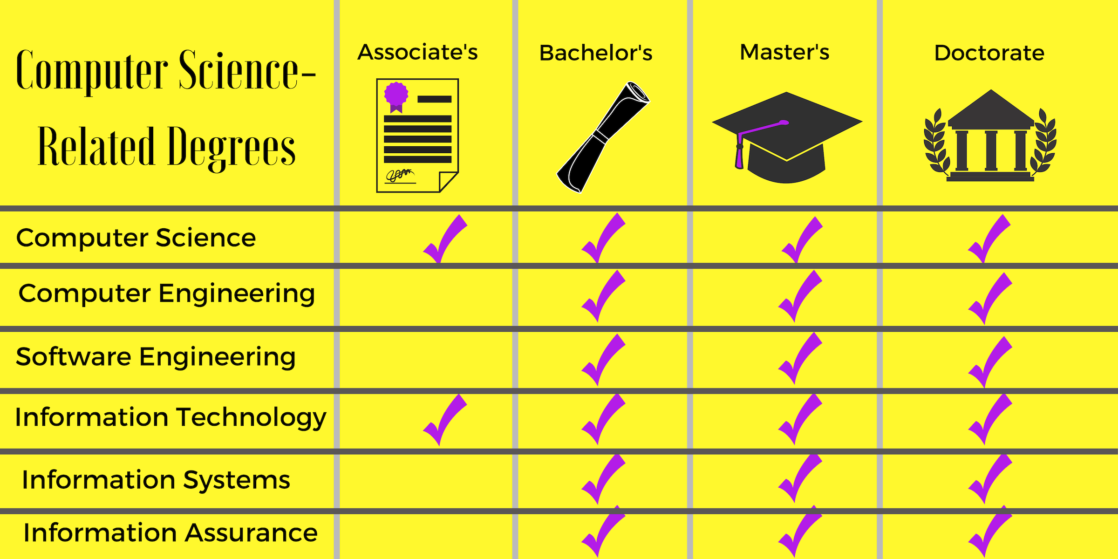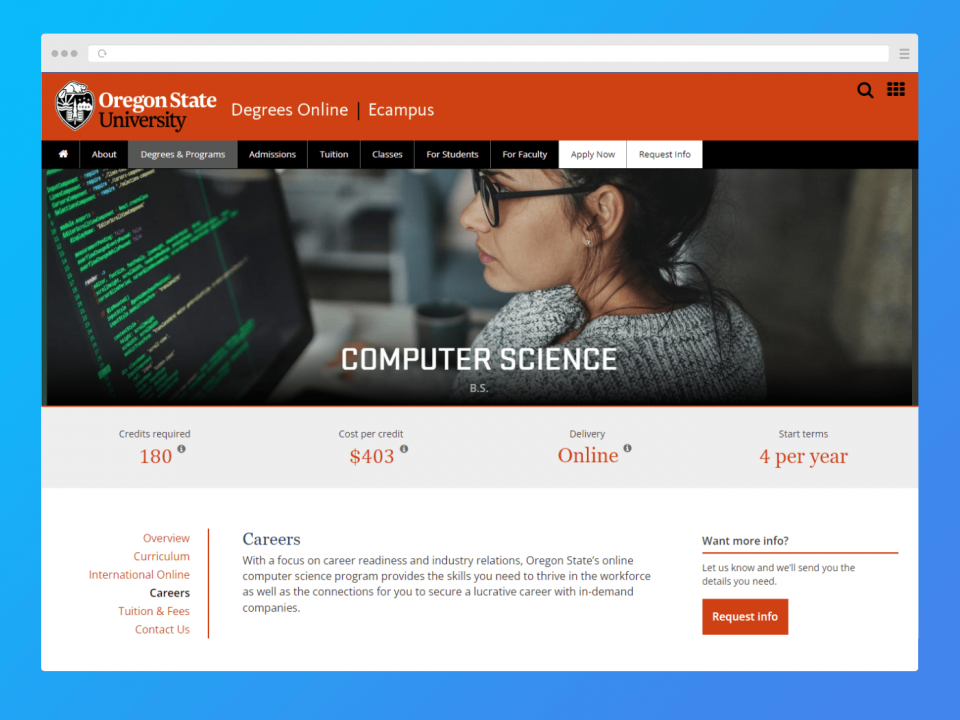With the rapid advancement of technology and the increasing demand for skilled professionals in the field of computer science, online computer degrees have become a popular choice for working professionals looking to advance their careers. These degrees offer flexibility and convenience, allowing individuals to balance work and personal commitments while pursuing higher education.
Toc
Introduction of Computer Degrees

Online computer degrees encompass a wide range of specializations, from software development and cybersecurity to data science and artificial intelligence. This diversity allows professionals to tailor their education to their specific career goals and interests. Additionally, reputable institutions often provide the same rigorous curriculum and esteemed faculty in their online programs as they do in their on-campus offerings. This ensures that online students receive a quality education that is both current and relevant to today’s job market. Moreover, the asynchronous nature of many online courses enables learners to progress at their own pace, making it easier to accommodate varying schedules and professional responsibilities. As a result, working professionals can enhance their skill set, increase their employability, and position themselves for advanced roles within their organizations or industries.
The Evolution of Online Education
Online education has come a long way since its inception. Initially met with skepticism and doubts about its effectiveness, it has now established itself as a reputable alternative to traditional classroom learning. With advancements in technology, such as virtual classrooms and interactive course materials, online education has become more immersive and engaging.
One major advantage of online education is accessibility. It breaks down barriers of location and time, making it possible for individuals to access quality education
The Growing Trend of Online Computer Degrees
In today’s fast-paced, digital world, many working professionals are looking to enhance their skills and advance their careers. One popular way to achieve this is by pursuing an online computer degree. With the rise of remote work and the increasing demand for technology experts, online computer degrees have become a viable option for those who want to keep pace with industry trends without sacrificing their current job. Moreover, the flexibility and convenience of online programs make it easier for professionals to balance their personal and work commitments while pursuing higher education.
Advantages of Online Computer Degrees
Apart from the flexibility and accessibility mentioned earlier, there are other advantages to pursuing an online computer degree. One of the most significant benefits is cost-effectiveness. Online programs often have lower tuition fees compared to traditional on-campus degrees, making it a more affordable option for many individuals. Additionally, online students save money on commuting or relocating costs, as well as expenses associated with campus living.
Another advantage is the ability to learn at one’s own pace. Asynchronous courses allow students to access course materials and lectures at a time that suits them best, making it possible to accommodate busy schedules and varying work hours. This flexibility also allows individuals to balance their studies with other responsibilities, such as family commitments or part-time jobs.
Benefits of Online Learning for Full-Time Professional

Networking Opportunities
Despite the physical distance, online computer degree programs often provide ample networking opportunities for students. Digital platforms such as discussion forums, group projects, and virtual meetups enable learners to connect with peers, professors, and industry professionals from around the world. These interactions can lead to valuable relationships, mentorship opportunities, and potential career advancements. Online students can also join professional organizations and attend virtual conferences, further expanding their network and staying updated on industry developments.
Practical Experience and Skill Development
Many online computer degree programs include practical components, such as labs, projects, and internships, that help students gain hands-on experience. This practical training is crucial for building technical skills and applying theoretical knowledge to real-world scenarios. Online platforms often provide access to cutting-edge software, tools, and resources, ensuring that students are well-equipped to tackle the challenges of the modern tech landscape. Additionally, many programs are designed in collaboration with industry partners, ensuring that the curriculum is aligned with current market needs and trends.
Career Advancement and Job Placement
Earning an online computer degree can significantly enhance a professional’s career prospects. Many online programs offer job placement services, including resume building, interview preparation, and connections to potential employers. Graduates often find that their newly acquired skills and credentials open doors to advanced roles, higher salaries, and increased job stability. Furthermore, the reputation of accredited online programs continues to grow, with many employers recognizing the value and rigor of online education.
Range of Online Computer Degree Programs

Online computer degree programs cater to a wide array of interests and career aspirations, providing specialized education in several key areas of the tech industry. Here are a few common types of online computer degrees:
Computer Science
An online degree in computer science equips students with a strong foundation in computer theory, programming languages, and software engineering. Graduates often pursue careers as software developers, data analysts, or systems engineers.
Information Technology
An online degree in information technology focuses on the application of technology to solve business problems. Students learn about network administration, cybersecurity, project management, and database management. Graduates often find employment as IT consultants, network administrators, or technical support specialists.
Data Science
With the rise of Big Data and its impact on businesses across industries, an online degree in data science has become increasingly popular. This program covers topics such as statistics, data mining, machine learning, and data visualization. Graduates often work as data scientists or analysts for companies seeking to make informed decisions based on data.
Web Development
An online degree in web development teaches students how to design, develop, and maintain websites and web applications. Students learn programming languages such as HTML, CSS, JavaScript, and PHP, as well as UX/UI design principles. Graduates often work as web developers or designers for companies of all sizes.
Tips for Choosing the Right Online Computer Degree Program

Selecting the right online computer degree program requires careful consideration of several factors to ensure that it aligns with your career goals, learning style, and personal circumstances. Here are some tips to help you make an informed decision:
Accreditation
Ensure that the program you choose is accredited by a recognized accrediting body. Accreditation is a mark of quality and indicates that the program meets certain standards of excellence. It also ensures that your degree will be recognized by employers and other educational institutions.
Curriculum and Specializations
Review the curriculum of each program to determine whether it covers the topics and skills that are most relevant to your career objectives. Some programs offer specializations or elective courses that allow you to tailor your education to specific areas of interest, such as artificial intelligence, cybersecurity, or mobile app development.
Faculty Expertise
Research the qualifications and expertise of the faculty members who will be teaching the courses. Experienced and knowledgeable instructors can greatly enhance your learning experience and provide valuable insights into the industry.
Student Support Services
Investigate the support services available to online students, including academic advising, technical support, and career counseling. Access to these resources can make a significant difference in your ability to succeed in the program and achieve your professional goals.
Flexibility and Schedule
Consider the program’s format and schedule to ensure that it fits with your personal and professional commitments. Some programs offer asynchronous courses that allow you to complete assignments at your own pace, while others may have synchronous sessions that require you to log in at specific times.
Cost and Financial Aid
Evaluate the total cost of the program, including tuition, fees, and any additional expenses. Look for financial aid options, such as scholarships, grants, or employer tuition reimbursement programs, that can help offset the cost of your education.
Alumni Network and Employment Outcomes
Look into the program’s alumni network and their career outcomes. A strong network of alumni can provide valuable connections and job opportunities. Additionally, programs with high employment rates for graduates can give you confidence in the program’s ability to help you advance your career.
By taking these factors into account, you can choose an online computer degree program that will provide you with the knowledge, skills, and credentials needed to succeed in the tech industry.
Success Stories of Working Professionals

Many working professionals have successfully leveraged their online computer degrees to achieve remarkable career advancements and personal growth. These success stories highlight the transformative power of online education and offer inspiration to prospective students.
Jane Smith – From Admin Assistant to Software Engineer
Jane Smith used to work as an administrative assistant in a small corporate office. Despite her lack of a formal computer science background, she had always been passionate about technology. Encouraged by the flexibility of online learning, Jane enrolled in an online computer science degree program. Through dedicated study and the support of her instructors, she mastered programming languages, software development, and algorithm design. Upon graduation, Jane secured a role as a junior software engineer at a reputable tech firm. She has since climbed the career ladder to become a senior software engineer, attributing her success to the strong foundation she gained through her online education.
Michael Johnson – Bridging the Gap in IT Consulting
Michael Johnson had years of experience working in the IT field but felt his career had stagnated. Seeking to bridge the gap between his practical experience and formal education, Michael pursued an online degree in information technology. The program’s comprehensive curriculum helped him acquire advanced skills in network administration, cybersecurity, and project management. With his enhanced expertise and the credential of an IT degree, Michael was able to establish his own IT consulting business. Today, he advises numerous companies on their IT strategies, enjoys a substantial increase in income, and has the flexibility to choose his clients.
Emily Rodriguez – Leading the Charge in Data Science
Emily Rodriguez was working as a marketing analyst when she decided to pivot her career toward data science. Recognizing the potential of Big Data, she enrolled in an online data science degree program. The rigorous coursework, which included machine learning, data mining, and data visualization, equipped her with the skills needed to excel in her new field. Emily now holds a senior position as a data scientist at a large corporation, where she leads a team in leveraging data to drive business decisions. Her journey illustrates the profound impact that an online degree can have on one’s career path.
These stories underscore the value and potential of online computer degree programs. They demonstrate that with dedication and the right educational resources, significant career advancements are within reach for working professionals.
Conclusion
Choosing the right online computer degree program is a critical decision that can have a lasting impact on your career trajectory. By carefully considering factors such as accreditation, curriculum, faculty expertise, student support services, flexibility, cost, and alumni network, you can make an informed choice that aligns with your professional aspirations. The success stories of Jane Smith, Michael Johnson, and Emily Rodriguez demonstrate that with commitment and the right resources, an online degree can be a powerful catalyst for career change and advancement. As the tech industry continues to evolve, equipping yourself with the latest knowledge and skills through a quality online program will position you for success in a competitive job market. Whether you are looking to break into a new field or enhance your current expertise, an online computer degree can be the key to unlocking new opportunities and achieving your career goals.











